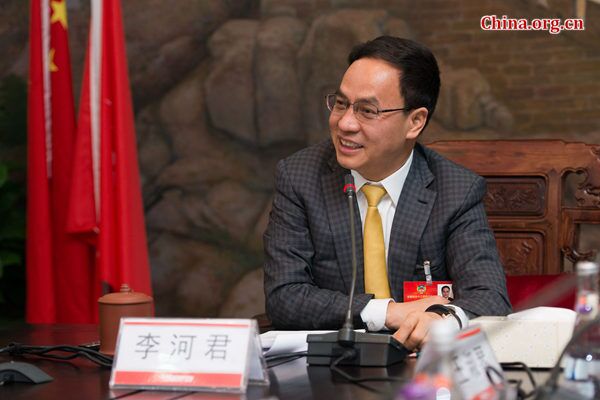Hanergy proposes PV in targeted poverty alleviation
- By Chen Boyuan
 0 Comment(s)
0 Comment(s) Print
Print E-mail China.org.cn, March 5, 2016
E-mail China.org.cn, March 5, 2016
 |
|
Li Hejun, founder and chairman of Hanergy Group and a member of the CPPCC, meets the press on Friday, March 4, 2016. [Photo by Chen Boyuan / China.org.cn] |
China's leading clean energy maker Hanergy has recently proposed raising the efficiency of targeted poverty alleviation using photovoltaic (PV) technologies, during the ongoing session of the Chinese People's Political Consultative Conference (CPPCC), the national advisory body, although the company itself has yet to work out the looming difficulties, regarding its suspended trading on the Hong Kong bourse.
Hanergy's chairman Li Hejun, also a member of the CPPCC, said on Friday that PV may play a central part in targeted poverty alleviation, especially in the areas without a stable power supply.
By installing PV panels on the roofs, each home can turn their own house into a mini solar power station, whose power generation would at least reduce the household's electricity bill if not entirely replace the grid power. Similarly, solar panels could also be installed on the roofs of greenhouses and on boats cruising along rivers, saving power without excessive extra investment.
Poverty reduction using PV technology is a focus for Hanergy this year, according to Li. It has matched the national plan of targeted poverty alleviation during the country's 13th Five-Year Plan, which is to be adopted during the current National People's Congress (NPC).
Li's proposal of having PV play a more important part in targeted poverty alleviation is only one of six proposals, all regarding PV technology, that he sent to the CPPCC. All of Li's six proposals this year are centered on thin-film PV, a comparably newer technology than the long-existing crystalline silicon.
Hanergy is one of three Chinese manufacturers of thin-film solar panels, and naturally Li would seek to create an opportunity for his products and meet the country's resolution. As a latecomer to the PV sector, Li claimed that thin-film panels have a general advantage over crystalline silicon plates, although he insisted that thin-film and crystalline silicon "are like brothers with an amicable coexistence."
Thin-film panels can ensure an even distribution of sunlight into a greenhouse, let infrared waves that vegetables need pass through, and absorb the ultraviolet band to generate electricity, according to Li. Hanergy has modified a greenhouse in Linfen, Shanxi Province, to mark China's first PV-based agricultural project for poverty reduction, the company's introduction revealed. "Only Hanergy is capable of doing this. Others [crystalline silicon] cannot do this. I am not saying how good we are, but stating the nature of our products," Li said, stressing the peripheral positive effects that thin-film PV are capable of, apart from generating electricity.
Apart from its flexibility and low weight, the thin-film panel possesses another principal advantage in its ability to operate in low light conditions. This is essential for southern provinces such as Guizhou and Yunnan, where excessive rains may affect PV panels' performance.
"Instead, rains will wash away the dust on the panels, increasing the sunlight they receive," Li explains, asserting why thin-film may be a better choice than crystalline silicon, despite the latter being cheaper, with this regard. "Additionally, western regions have abundant sunshine, but also more dust. In that situation our thin-film's low-light capability will also make a difference."
During the CPPCC, the Hanergy chief pleaded with the public as well as with the press to increase corporate effort on civilian and personal products, ensuring them that thin-film PV technologies are bound to have a bright future, seemingly unaffected by the setbacks the company sustained last year.
Currently, the group company's Hong Kong-listed Hanergy Thin-Film Power (HK. 00566) is still seeking to resume trading on the Hong Kong Stock Exchange (HKEx).
"The company is making constant efforts to resume trading. We believe the stock plunge was the result of malicious short-selling. It was indeed a heavy blow. It taught us the lesson that we should assume a 'down-to-earth' attitude and avoid complacency regarding temporary achievements," Li said, declining to reveal more now that the company is in a "quiet period" before the Hong Kong-listed branch will release its annual financial report at the end of this month.
Likewise, Li refuted allegations that he sought to sell the Jin'anqiao Hydropower Station, the company's cornerstone, to ease the group's cash difficulties. "Reports claimed that I am selling my asset. Now, I would like to clarify. I did not," said Li.





